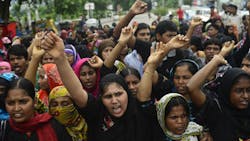Bangladesh Defends New Labor Law Amid Criticism
DHAKA, Bangladesh—Bangladesh today defended its new labor laws and said it is angry at criticism from the International Labor Organization (ILO), which called the legislation inadequate.
Parliament passed the legislation last week in the wake of a garment factory disaster in April that killed 1,129 people, highlighting poor safety standards in the industry.
Lawmakers said the new law ensured full trade union rights for millions of laborers, as it scrapped previous provisions requiring factory owners to approve the formation of a union.
In a statement issued Monday, however, the ILO said that the law fell short of "several important steps called for" by the organization, notably related to restrictions on workers' freedom of association.
The law stipulates that workers can form a union only if 30% of employees approve of it in advance.
Bangladeshi officials today told a press briefing that Dhaka had vented its anger at the ILO over the public criticism.
"We've protested," Labor Minister Rajiuddin Ahmed Raju said. "It's not acceptable. We're writing a letter seeking explanation as to why this kind of statement was issued."
Dhaka Pushed to Revamp Law
Bangladesh, the world's second-argest garment exporter, has been under intense international pressure to overhaul labor laws since the April 24 tragedy, one of the world's worst industrial disasters.
The garment industry, which relies on cheap labor to keep itself competitive, is the mainstay of the economy, making up 40% of its industrial workforce and 80% of its $25 billion annual exports.
The United States last month canceled a trade privilege for Bangladesh, alleging that it had not done enough to ensure workplace safety.
There was no immediate reaction to the new law from the U.S. or the European Union, who together account for about 80% of Bangladesh's $21.5 billion garment exports.
Washington last week outlined an action plan for Dhaka to restore the privilege, saying it should implement new laws that offer freedom of association and collective bargaining.
Raju defended the requirement for 30% of the workforce to approve formation of a union.
"If you don't have support of 30% of the employees, you don't have any right to form a union," he said.
Copyright Agence France-Presse 2013
About the Author
Agence France-Presse
Copyright Agence France-Presse, 2002-2025. AFP text, photos, graphics and logos shall not be reproduced, published, broadcast, rewritten for broadcast or publication or redistributed directly or indirectly in any medium. AFP shall not be held liable for any delays, inaccuracies, errors or omissions in any AFP content, or for any actions taken in consequence.
